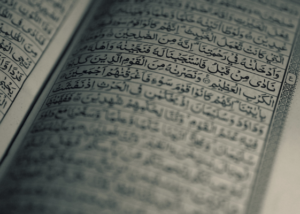Is voting Haram? People say democracy is against Islam so Muslims cannot vote. Is this true?
Quran
Hadith
Islamic Text
بِسْمِ اللَّهِ الرَّحْمَنِ الرَّحِيمِ
In the Name of Allah Most Merciful Most Kind
Short Answer
Voting is not Haram if it is done for religious benefit. Therefore, to engage in a political system that is not Islamic is permitted if it is being done to spread truth, justice and religious values.
Explanation
قَالَ اجْعَلْنِي عَلَى خَزَائِنِ الْأَرْضِ إِنِّي حَفِيظٌ عَلِيمٌ
He said, ‘Appoint me over the storehouses of the land. Indeed, I am a knowledgeable guardian.’ (Surah Yusuf, 55).
In the Quranic verse above, we find the blessed Prophet Yusuf (peace be upon him), engaging in a political system that was not Islamic. He asked the king for a position in the government despite it being an unislamic system. This can be used as evidence to prove that voting is not Haram. Since, the argument many put forward is that engaging with a political system that is not Islamic is Haram.
وإنما طلب منه الولاية رغبة منه في العدل وإقامة الحق والإحسان، وكان هذا الملك كافرا، ويستدل بذلك على أنه يجوز للرجل الفاضل أن يعمل للرجل الفاجر إذا علم أنه يصلح بعض الأحوال. (التسهيل لعلوم التنزيل)
He only asked him for guardianship to establish justice, truth and kindness. This king was an infidel. Thus, it is used as proof that it is permissible for a virtuous man to work for an evil man, if he knows that he will improve the situation to a degree. (Imam Ibn Juzay al-Kalbi 741H, al-Tasheel li Uloom al-Tanzeel).
Conditions
As seen in the Nass (text) above, there are conditions to political engagement in a Kufr system. It is not unconditionally permitted. Therefore, such conditions must be known and observed. So, one of the conditions is knowing that one can actually improve the situation. Another is that there is no sufficiently effective means other than engaging with the system.
قالوا: وفيه دليل على أنه يجوز أن يتولى الإنسان عمالة من يد سلطان جائر، وقد كان السلف يتولون القضاء من جهة الظلمة. وإذا علم النبي أو العالم أنه لا سبيل إلى الحكم بأمر الله ودفع الظلم إلا بتمكين الملك الكافر أو الفاسق فله أن يستظهر به. (تفسير النسفي)
They said: It contains proof that it is permissible for a person to assume authority from the hand of an oppressive ruler. Indeed, the Salaf (early Muslims) used to accept positions as judges from oppressors. If a Prophet or scholar knows that there is no way to establish Allah’s command and repel injustice except by empowering a disbelieving or sinful king, then he may use it. (Tafseer al-Nasafi, 710H).
The Nass above asserts that political engagement in a Kufr system is not permitted if it will cause one to become a puppet in the hands of the ruling elite. Therefore, one cannot vote for a candidate that will not have the freedom to work for positive change. This condition has been mentioned by many classical scholars.
إِنِّي حفيظ عليم. أَي: حفيظ للخزائن، عليم بِوُجُوه مصالحها. وَفِي بعض التفاسير: ” إِنِّي حفيظ عليم ” أَي: كَاتب حاسب. فَإِن قيل: هَل يجوز أَن يتَوَلَّى الْمُسلم من يَد كَافِر عملا؟ قُلْنَا قد قَالُوا: إِنَّه إِذا علم أَن الْكَافِر يخليه وَالْعَمَل بِالْحَقِّ يجوز أَن يتَوَلَّى. (تفسير السمعاني)
I am a knowledgeable guardian. Meaning, guardian for the storehouses. Knowledgeable regarding the means of their rectification. In some books of Tafseer: I am a knowledgeable guardian, means (diligent in) writing and accounting. If it is said, can a Muslim take (such) employment from a Kafir? We reply, that they (the scholars) said: If he knows that the Kafir will leave him to work upon the truth it is permitted for him to take it. (Tafseer al-Sam’aani 489H).
Practical examples
In the biography of the blessed Prophet ﷺ, we find practical examples of people engaging in Kufr systems to help Muslims. A prominent example is that of al-Najashi. He was the king of Abyssinia and embraced Islam secretly. Therefore, he was unable to rule by the Islamic system. Despite this, he assisted the Muslims greatly and granted them protection from oppression.
In the following Hadith narration, we find the Sahabah praying for him to maintain his position of power. This is despite the fact that he was not ruling according to the entirety of the Islamic system.
This can be used as proof to assert that voting is not Haram. This is because if it is always wrong to participate in a political system that is not Islamic, then it would be prohibited to pray for the continuation of such activities. However, the Sahabah prayed for the Najashi to retain power and continue in his position. Thus, it can be used as proof for the position that voting is not Haram.
قَالَتْ: وَدَعَوْنَا اللهَ تَعَالَى لِلنَّجَاشِيِّ بِالظُّهُورِ عَلَى عَدُوِّهِ وَالتَّمْكِينِ لَهُ فِي بِلَادِهِ، وَاسْتَوْسَقَ عَلَيْهِ أَمْرُ الْحَبَشَةِ، فَكُنَّا عِنْدَهُ فِي خَيْرِ مَنْزِلٍ، حَتَّى قَدِمْنَا عَلَى رَسُولِ اللهِ صَلَّى اللهُ عَلَيْهِ وَسَلَّمَ وَهُوَ بِمَكَّةَ
She (Sayidah Umm Salamah) said: We prayed to Allah Almighty for the Najashi to defeat his enemies and become firmly established in his lands. Control of the affairs of Abyssinia was established for him. So we were in the best place with him. Until we came to the Messenger of Allah ﷺ in Mecca. (Musnad Ahmad, 22498).
رَوَاهُ أَحْمَدُ، وَرِجَالُهُ رِجَالُ الصَّحِيحِ غَيْرَ إِسْحَاقَ، وَقَدْ صَرَّحَ بِالسَّمَاعِ. (مجمع الزوائد ومنبع الفوائد)
It was narrated by Ahmad. The narrators are all the narrators of Sahih except for (Ibn) Ishaq. Although he was explicit regarding his hearing it directly. (Imam Noorud-deen al-Haythami 807H, Majma al-Zawaid).
It can be argued that the blessed Prophet ﷺ himself engaged with the political system in Makkah and encouraged others to do the same. This is because the tribal politics in Makkah had the concept of protection (Jiwaar). Meaning, tribal chiefs could offer protection to people and others had to respect it. The blessed Prophet and many Sahabah sought and enjoyed this protection.
Hilf al-Fudool
عَنْ عَبْدِ الرَّحْمَنِ بْنِ عَوْفٍ، عَنِ النَّبِيِّ صَلَّى اللهُ عَلَيْهِ وَسَلَّمَ، قَالَ: شَهِدْتُ حِلْفَ الْمُطَيَّبِينَ مَعَ عُمُومَتِي وَأَنَا غُلامٌ، فَمَا أُحِبُّ أَنَّ لِي حُمْرَ النَّعَمِ، وَأَنِّي أَنْكُثُهُ
Abd al-Rahman ibn Awf (May Allah Most High be pleased with him) narrated that the Prophet ﷺ said: When I was a young boy, I was present with my uncles at the alliance of the perfumed (Hilf al-Mutayyabin). I would not break it, even for red camels. (Musnad Ahmad, 1655).
رَوَاهُ أَحْمَدُ وَأَبُو يَعْلَى وَالْبَزَّارُ، وَرِجَالُ حَدِيثِ عَبْدِ الرَّحْمَنِ بْنِ عَوْفٍ رِجَالُ الصَّحِيحِ. (مجمع الزوائد ومنبع الفوائد)
It was narrated by Ahmad, Abu Ya’la and al-Bazzar. The narrators of the Hadith of Abd al-Rahman bin Awf are Sahih narrators. (Imam Noorud-deen al-Haythami 807H, Majma al-Zawaid).
Hilf al-Fudool is often referred to as Hilf al-Mutayibeen. It was an agreement amongst prominent members of the community in Makkah to stand united against oppressors. This took place prior to the revelation of the Holy Quran and the blessed Prophet ﷺ was a participant in it. The Prophet ﷺ praised it after revelation too.
It is sometimes used as a proof for the view that voting is not Haram. This is due to the fact that it seems to be a form of political activism and engagement. Yet, it was in the context of a non-Islamic political system.
Potent activism
Some people who deem voting to be prohibited do engage in other forms of political activism. Including protests, petitions and writing to political figures. This is important. However, the people in authority are unlikely to take any of it seriously if they know that it will not impact voting.
Other forms of political activism will only truly yield results if they are carried out in conjunction with strategic voting. If politicians know that you will not vote for or against them, then unfortunately they will not take you seriously. Consequently, being elected or re-elected is the primary concern for most politicians. If you are not influencing that, then they are happy to ignore you.
Conclusion
Voting is not Haram. We do not believe that anyone other than Allah (Most High) has the right to decree law. However, that does not mean we cannot be politically active in systems that do not uphold this truth. Although this is the case, we must maintain our belief and not deviate from it.
Therefore, we must vote and engage politically in order to bring the community closer to the truth. This is because something that cannot be achieved in entirety should be attained to the degree possible. As such, if we cannot establish absolute justice, we will work to establish as much justice as possible.
And Allah Most High Knows Best.
–Answered by Shaykh Noorud-deen Rashid (02.05.24)
-Approved by Shaykh Mazin Bakeer (Damascus, Syria)






